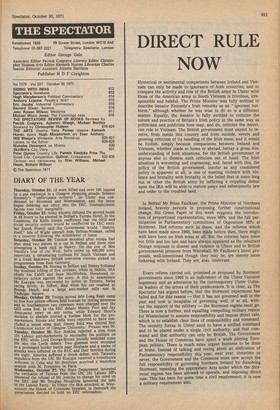DIRECT RULE NOW
Hysterical or sentimental comparisons between Ireland and Vietnam can only be made in ignorance of both countries; and to compare the activity and role of the British army in Ulster with those of the American army in South Vietnam is frivolous, irresponsible and baleful. The Prime Minister was fully entitled to describe Senator Kennedy's Irish remarks as an "ignorant outburst," although whether he was wise to do so is a different matter. Equally, the Senator is fully entitled to criticize the nature and practice of Britain's Irish policy in the same way as politicians and publicists here may, and do, criticize the American role in Vietnam. The British government must expect to receive, from inside this country and from outside, severe and growing criticism of its handling of the Irish mess; and it would be foolish, simply because comparisons between Ireland and Vietnam, whether made at home or abroad, betray a gross misunderstanding of both situations, for the British government or anyone else to dismiss such criticism out of hand. The Irish situation is worsening and coarsening; and, faced with this, the policy of the British government, insofar as any considered policy is apparent at all, is one of meeting violence with violence and brutality with brutality in the belief that in some long run or other the British army by inflicting a crippling defeat upon the IRA will be able to restore peace and subsequently law and order to the troubled land.
In Belfast Mr Brian Faulkner, the Prime Minister of Northern Ireland, bravely persists in proposing further constitutional change. His Green Paper of this week suggests the introduction of proportional representation, more MPs, and the full participation in Parliamentary committees of Opposition MPs at Stormont. Had reforms such as these, and the reforms which have been made since 1968, been made before then, there might well have been no Irish mess at all. But the reforms have come too little and too late and have always appeared as the reluctant Orange response to dissent and violence in Ulster and to British governmental pressure from Whitehall. Mr Faulkner's latest proposals, well-intentioned though they may be, are merely more tinkering with Ireland. They are, alas, irrelevant.
Every reform carried out, promised or proposed by Stormont governments since 1968 is an indictment of the Ulster Unionist hegemony and an admission by the contemporary Ulster Unionist leaders of the errors of their predecessors. It is clear, as The Spectator has argued before, that the Stormont experiment has failed and for this reason — that it has not governed well in the past and now is incapable of governing well, if at all, without the support of the military — the Stormont regime must go. There is now a further, and equalling compelling military reason for Westminster to assume responsibility and impose direct rule, which is to establish clear lines of responsibility and command. The security forces in Ulster need to have a unified command and to be placed under a single civil authority, and that command and that authority can only be British. The Government and the House of Commons have spent a week playing European politics. There is much more urgent business to be done at home. Instead of talking and voting about an abdication of Parliamentary responsibility this year, next year, sometime or never, the Government and the Commons must now accept the full responsibility of governing Northern Ireland by dissolving Stormont, repealing the appropriate Acts under which the Stormont regime has been allowed to operate, and imposing direct rule. This has been for some time a civil requirement; it is now a military requirement also.


































 Previous page
Previous page